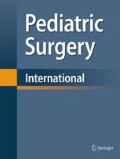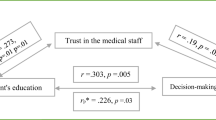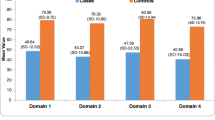Abstract
Purpose
To investigate the anxiety, depression, stress, and quality of life of parents with children diagnosed with anorectal malformations.
Methods
68 parents participated in the study and completed the unified Self-Rating Anxiety Scale, Self-Rating Depression Scale, Perceived Stress Scale, and the World Health Organization Quality of Life-BREF.
Results
Compared with the Chinese reference values, parents in our study had higher scores on anxiety and depression and lower scores on the psychological and environmental domain of the World Health Organization Quality of Life-BREF. Parents who live in rural areas, pay for medical treatment out of pocket, and have multiple children are prone to feel anxious. Parents with multiple children also scored worse in the domains of physiology, psychology, social relationships, and general quality of life assessment. They scored significantly lower in the domains of psychology and social relationships when parents had a low education level. Parents of children who had undergone staged operations got lower scores on the general quality of life assessment.
Conclusions
Parents of children with anorectal malformations have varying degrees of psychological and emotional problems that require attention in the clinic.
Similar content being viewed by others
Data availability
The datasets used during the current study are available from the corresponding author on reasonable request.
References
Peña A. Bischoff A. (2015) Surgical treatment of colorectal problems in children. Springer Cham, Switzerland. https://doi.org/10.1007/978-3-319-14989-9
Levitt MA, Pena A (2007) Anorectal malformations. Orphanet J Rare Dis 2:1750. https://doi.org/10.1186/1750-1172-2-33
van der Steeg HJJ, van Rooij I, Iacobelli BD et al (2022) Bowel function and associated risk factors at preschool and early childhood age in children with anorectal malformation type rectovestibular fistula: An ARM-Net consortium study. J Pediatr Surg 57:89–96. https://doi.org/10.1016/j.jpedsurg.2022.02.015
Hassink EA, Brugman-Boezeman AT, Robbroeckx LM et al (1998) Parenting children with anorectal malformations: implications and experiences. Pediatr Surg Int 13:377–383. https://doi.org/10.1007/s003830050344
Funakosi S, Hayashi J, Kamiyama T et al (2005) Psychosocial liaison-consultation for the children who have undergone repair of imperforate anus and Hirschsprung disease. J Pediatr Surg 40:1156–1162. https://doi.org/10.1016/j.jpedsurg.2005.03.059
Ludman L, Spitz L (1995) Psychosocial adjustment of children treated for anorectal anomalies. J Pediatr Surg 30:495–499. https://doi.org/10.1016/0022-3468(95)90065-9
Judd-Glossy L, Ariefdjohan M, Curry S et al (2019) A survey of adults with anorectal malformations: perspectives on educational, vocational, and psychosocial experiences. Pediatr Surg Int 35:953–961. https://doi.org/10.1007/s00383-019-04508-y
Grano C, Aminoff D, Lucidi F, Arpante A, Violani C (2008) Self-efficacy, postoperative care satisfaction, body image and sexual functioning in ARM patients. Pediatr Surg Int 24:1201–1205. https://doi.org/10.1007/s00383-008-2233-6
Hamid CH, Holland AJ, Martin HC (2007) Long-term outcome of anorectal malformations: the patient perspective. Pediatr Surg Int 23:97–102. https://doi.org/10.1007/s00383-006-1841-2
Aminoff D, La Sala E, Zaccara A (2006) Follow-up of anorectal anomalies: the Italian parents’ and patients’ perspective. J Pediatr Surg 41:837–841. https://doi.org/10.1016/j.jpedsurg.2005.12.061
Grano C, Bucci S, Aminoff D, Lucidi F, Violani C (2013) Does mothers’ perception of social support mediate the relationship between fecal incontinence and quality of life of the child? Pediatr Surg Int 29:919–923. https://doi.org/10.1007/s00383-013-3358-9
Akin SB, Demiroğullari B, Ozen O et al (2014) Quality of life and anxiety in Turkish patients with anorectal malformation. J Paediatr Child Health 50:107–111. https://doi.org/10.1111/jpc.12406
Witvliet M, Sleeboom C, de Jong J et al (2014) Anxiety and quality of life of parents with children diagnosed with an anorectal malformation or Hirschsprung disease. Eur J Pediatr Surg 24:70–74. https://doi.org/10.1055/s-0033-1353491
Witvliet MJ, Bakx R, Zwaveling S, van Dijk TH, van der Steeg AF (2016) Quality of life and anxiety in parents of children with an anorectal malformation or Hirschsprung disease: the first year after diagnosis. Eur J Pediatr Surg 26:2–6. https://doi.org/10.1055/s-0035-1559885
Gill TM, Feinstein AR (1994) A critical appraisal of the quality of quality-of-life measurements. JAMA 272:619–626
Pruthi GK, Mohta A (2010) Psychosocial burden and quality of life in parents of children with anorectal malformation. J Indian Assoc Pediatr Surg 15:15–18. https://doi.org/10.4103/0971-9261.69135
Ojmyr-Joelsson M, Nisell M, Frenckner B, Rydelius PA, Christensson K (2006) Parental experiences: care of children with high and intermediate imperforate anus. Clin Nurs Res 15:290–305. https://doi.org/10.1177/1054773806291856
Acknowledgements
We gratefully acknowledge the support of the Program for Youth Innovation in Future Medicine, Chongqing Medical University (grant number: W0125) and General Program for Clinical Medical Research of National Clinical Research Center for Child Health and Disorders (grant number: NCRCCHD-2022-GP-03).
Author information
Authors and Affiliations
Contributions
BY: Conceived the study, collected the data, interpreted the data, wrote the first draft, and revised the manuscript. FW: Wrote the first draft, analyzed the data, and revised the manuscript. YW: Collected and analyzed the data, and revised the manuscript. WF and JH: Conceived the study, interpreted the data, and revised the manuscript. RL: Conceived the study, revised the manuscript and she is accountable for all aspects of the work. All authors have read and approved the manuscript for publication.
Corresponding author
Ethics declarations
Conflict of interest
The authors declare that there are no conflicts of interest.
Additional information
Publisher's Note
Springer Nature remains neutral with regard to jurisdictional claims in published maps and institutional affiliations.
Rights and permissions
Springer Nature or its licensor (e.g. a society or other partner) holds exclusive rights to this article under a publishing agreement with the author(s) or other rightsholder(s); author self-archiving of the accepted manuscript version of this article is solely governed by the terms of such publishing agreement and applicable law.
About this article
Cite this article
Ying, B., Wu, F., Wang, Y. et al. Negative emotions and quality of life of parents with children diagnosed with anorectal malformations. Pediatr Surg Int 39, 190 (2023). https://doi.org/10.1007/s00383-023-05469-z
Accepted:
Published:
DOI: https://doi.org/10.1007/s00383-023-05469-z




